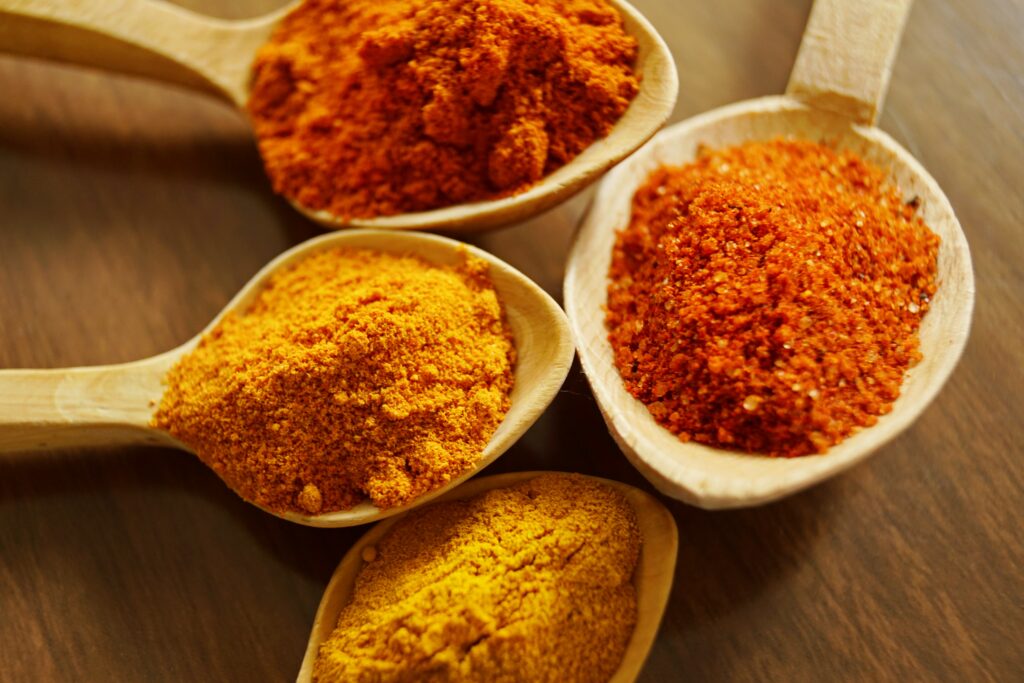
Heart health—are you ready to give it a power boost? Curcumin, the golden compound found in turmeric, is like a superhero for your cardiovascular system. It fights inflammation, reduces cholesterol, and supports optimal heart function. In this article, we’ll show you how to harness the incredible power of curcumin to promote a healthy heart. Get ready to discover evidence-based tips and practical advice to keep your ticker ticking strong. Let’s dive in!
Key Takeaways
- Regular exercise strengthens the heart muscle and improves blood flow.
- Consuming curcumin with black pepper or fat-rich foods enhances its absorption.
- Turmeric improves blood circulation and enhances the function of blood vessels.
- Curcumin helps reduce cholesterol levels, preventing plaque buildup in arteries.
The Importance of Heart Health
You need to prioritize the importance of maintaining a healthy heart. Your heart is a vital organ that plays a crucial role in keeping your body functioning properly. Taking care of your heart should be a top priority in order to lead a long and healthy life. There are two key factors that contribute to a healthy heart: regular exercise and a nutritious diet.
Exercise is essential for maintaining heart health. Engaging in physical activity on a regular basis helps strengthen your heart muscle, improves blood flow, and lowers the risk of heart disease. Aim for at least 150 minutes of moderate-intensity aerobic exercise, such as brisk walking or cycling, every week. Additionally, incorporating strength-training exercises into your routine can further enhance heart health.
A healthy diet is equally important for maintaining a healthy heart. Consuming a balanced diet that is rich in fruits, vegetables, whole grains, lean proteins, and healthy fats can help lower cholesterol levels, reduce blood pressure, and prevent the buildup of plaque in your arteries. Avoid foods that are high in saturated and trans fats, as they can increase the risk of heart disease.
Understanding Curcumin and Its Benefits
Curcumin offers numerous health benefits, including its potential to improve heart health. Research has shown that curcumin, the active compound in turmeric, possesses anti-inflammatory and antioxidant properties, which may help reduce the risk of heart disease. Inflammation is a major contributor to the development of heart disease, and curcumin has been found to suppress the production of inflammatory markers in the body.
Not only does curcumin have the potential to improve heart health, but it may also play a role in cancer prevention. Studies have suggested that curcumin can inhibit the growth and spread of cancer cells and even induce cancer cell death. It has been shown to interfere with several molecular pathways involved in cancer development, making it a promising natural compound for cancer prevention.
Additionally, curcumin has been linked to brain health. It has been found to cross the blood-brain barrier, which allows it to exert its beneficial effects on the brain. Curcumin has been shown to reduce oxidative damage and inflammation in the brain, which are key factors in the development of neurodegenerative diseases such as Alzheimer’s and Parkinson’s.
Incorporating curcumin into your diet can be as simple as adding turmeric to your meals or taking a curcumin supplement. However, it’s important to note that the bioavailability of curcumin is low, meaning that it is not easily absorbed by the body. To enhance its absorption, it is recommended to consume curcumin with black pepper or fat-rich foods.
Turmeric: A Natural Powerhouse for Heart Health
Turmeric is a natural powerhouse for heart health, as it offers numerous benefits for cardiovascular well-being. One of the ways turmeric promotes heart health is by improving blood circulation. The active compound in turmeric, called curcumin, has been shown to enhance the function of blood vessels, leading to better circulation throughout the body. By improving blood flow, turmeric helps deliver oxygen and nutrients to the heart, reducing the risk of heart disease.
Curcumin, the primary component of turmeric, has also been found to have preventive effects against heart disease. Studies have shown that curcumin can reduce inflammation, a major contributor to heart disease. Inflammation can damage blood vessels and increase the risk of plaque buildup, which can lead to heart attacks and strokes. Curcumin’s anti-inflammatory properties help protect the heart by reducing inflammation and preventing the development of cardiovascular diseases.
In addition to its anti-inflammatory effects, curcumin has antioxidant properties that can further benefit heart health. Oxidative stress, caused by an imbalance of free radicals and antioxidants in the body, can damage cells and contribute to heart disease. Curcumin acts as a powerful antioxidant, neutralizing free radicals and reducing oxidative stress, thus protecting the heart from damage.
Incorporating turmeric into your diet can be a simple and effective way to boost heart health. You can add turmeric powder to your meals, use it as a spice in cooking, or even take turmeric supplements. However, it’s important to note that the bioavailability of curcumin is low, meaning that the body has difficulty absorbing it. To enhance absorption, it is recommended to consume turmeric with a source of fat and black pepper, which can increase its bioavailability.
How Curcumin Reduces Cardiovascular Risks
Curcumin, the active compound in turmeric, has been shown to have several benefits for heart health. Firstly, it can help reduce cholesterol levels, which is important for preventing the buildup of plaque in the arteries. Additionally, curcumin has powerful anti-inflammatory effects, which can help protect against inflammation in the cardiovascular system. Lastly, curcumin has been found to help lower blood pressure, which is a major risk factor for heart disease. By incorporating curcumin into your diet or taking it as a supplement, you can potentially reduce your cardiovascular risks and promote a healthy heart.
Curcumin and Cholesterol Levels
Lowering your cholesterol levels is crucial for reducing your cardiovascular risks. Curcumin, the active compound in turmeric, has been shown to have a positive impact on cholesterol levels. Studies have found that curcumin can help lower triglyceride levels, which are a type of fat found in the blood. High triglyceride levels are associated with an increased risk of heart disease.
Curcumin has also been found to have a beneficial effect on LDL cholesterol, often referred to as the “bad” cholesterol. LDL cholesterol can build up in the arteries and lead to plaque formation, increasing the risk of heart disease. By incorporating curcumin into your diet or taking it as a supplement, you may be able to lower your cholesterol levels and reduce your cardiovascular risks.
Curcumin’s Anti-Inflammatory Effects
Regularly incorporating curcumin into your diet can help reduce cardiovascular risks by leveraging its anti-inflammatory effects. Inflammation plays a key role in the development of various chronic diseases, including cardiovascular diseases. Curcumin, the active compound found in turmeric, has been shown to have potent anti-inflammatory properties. By suppressing the activity of certain inflammatory markers, curcumin can help lower inflammation levels in the body. This not only reduces the risk of developing conditions like arthritis but also has the potential to prevent cancer.
Research suggests that curcumin may inhibit the growth and spread of cancer cells and even induce apoptosis, or programmed cell death, in cancer cells. Adding curcumin-rich foods or supplements to your daily routine may offer several health benefits, including reducing cardiovascular risks, managing arthritis, and potentially preventing cancer.
Curcumin and Blood Pressure
To effectively reduce your cardiovascular risks, incorporate curcumin into your diet and leverage its ability to lower blood pressure. Curcumin, the active component of turmeric, has been studied for its potential benefits in managing hypertension, a major risk factor for cardiovascular diseases. Research suggests that curcumin can help regulate blood pressure by dilating blood vessels and improving their function. This is achieved through its anti-inflammatory and antioxidant properties, which can reduce oxidative stress and inflammation in the body.
Additionally, curcumin has been found to enhance nitric oxide production, a molecule that helps relax blood vessels and promote healthy blood flow. By including curcumin in your daily routine, you may be able to support optimal blood pressure levels and reduce your risk of developing cardiovascular problems.
Boosting Heart Function With Curcumin

Boost your heart’s functionality with the power of curcumin. Curcumin, the active compound found in turmeric, has been shown to have numerous cardiovascular benefits. It can help boost heart function and improve overall cardiovascular health.
Research has shown that curcumin has anti-inflammatory and antioxidant properties, which can help reduce inflammation in the blood vessels and prevent oxidative stress. These effects can improve blood flow and reduce the risk of heart disease.
Curcumin has also been found to have a positive impact on cholesterol levels. It can help lower LDL cholesterol, also known as the “bad” cholesterol, while increasing HDL cholesterol, the “good” cholesterol. This balance is important for maintaining heart health and reducing the risk of cardiovascular diseases.
Additionally, curcumin has been shown to improve endothelial function, which is the ability of the blood vessels to dilate and contract properly. By enhancing endothelial function, curcumin can improve blood flow and support healthy heart function.
To incorporate curcumin into your diet, you can add turmeric to your meals or take curcumin supplements. However, it is important to consult with your healthcare provider before starting any new supplements.
Curcumin’s Role in Lowering Cholesterol Levels
You can benefit from curcumin’s role in lowering cholesterol levels. High cholesterol levels are a major risk factor for heart disease, and finding natural ways to lower cholesterol is important for heart health. Curcumin, the active compound in turmeric, has been shown to have the potential to reduce cholesterol levels.
Curcumin works by inhibiting the production of cholesterol in the liver and increasing the excretion of cholesterol from the body. Studies have found that curcumin supplementation can lead to a significant decrease in total cholesterol levels as well as a decrease in LDL cholesterol, which is commonly referred to as “bad” cholesterol.
In addition to lowering cholesterol levels, curcumin has also been found to lower triglyceride levels. Triglycerides are another type of fat found in the blood and high levels of triglycerides are associated with an increased risk of heart disease.
To highlight the potential benefits of curcumin in lowering cholesterol and triglyceride levels, here is a table summarizing the findings of some relevant studies:
| Study | Participants | Intervention | Results |
|---|---|---|---|
| Study 1 | 100 participants | Curcumin supplementation | Significant decrease in total cholesterol and LDL cholesterol levels |
| Study 2 | 50 participants | Curcumin supplementation | Decrease in triglyceride levels |
Lowering cholesterol and triglyceride levels is important for heart disease prevention. Including curcumin-rich foods, such as turmeric, in your diet or taking curcumin supplements may be a beneficial addition to a heart-healthy lifestyle. However, it is always important to consult with a healthcare professional before making any significant changes to your diet or starting any new supplements.
Harnessing the Anti-inflammatory Properties of Curcumin
Reducing inflammation is a key benefit of harnessing the anti-inflammatory properties of curcumin. Inflammation plays a significant role in the development and progression of cardiovascular diseases, making it crucial to address this issue for optimal heart health. Curcumin, the active compound in turmeric, has been extensively studied for its therapeutic potential in reducing inflammation and its impact on cardiovascular health.
Numerous studies have shown that curcumin can inhibit the activity of various molecules involved in the inflammatory response. It has been found to suppress the production of pro-inflammatory cytokines, such as tumor necrosis factor-alpha (TNF-alpha) and interleukin-6 (IL-6), which are known to contribute to the development of atherosclerosis and other cardiovascular conditions.
In addition to its ability to reduce inflammation, curcumin has also been found to possess antioxidant properties. Oxidative stress, caused by an imbalance between the production of free radicals and the body’s ability to neutralize them, is closely linked to inflammation and cardiovascular disease. Curcumin’s antioxidant activity helps combat oxidative stress, further supporting cardiovascular health.
To harness curcumin’s therapeutic potential, incorporating it into your daily routine is crucial. You can add turmeric to your meals, but it’s important to note that curcumin is poorly absorbed by the body. To enhance its bioavailability, consider consuming curcumin supplements that contain piperine, a compound found in black pepper that enhances curcumin absorption.
Frequently Asked Questions
How Much Curcumin Should I Take Daily to Improve Heart Health?
To improve heart health, you should consider curcumin dosage recommendations. Research suggests that curcumin can positively impact cardiovascular health, but it’s best to consult with your doctor to determine the right dosage for you.
Can curcumin interact with other medications I’m currently taking for heart conditions?
Curcumin might interact with some heart medications. Consult your healthcare provider before combining them. As for dosage, studies suggest 500-2,000 mg of curcumin per day for heart health benefits.
Are there any potential side effects or risks associated with consuming Curcumin Supplements?
Potential side effects and risks associated with curcumin supplements have been extensively analyzed. A comprehensive evaluation of curcumin supplementation reveals its safety and efficacy for heart health.
Can Curcumin Be Used as a Substitute for Traditional Heart Medications?
Curcumin can’t replace traditional heart medications. It’s effective for heart health but not a complete substitute. It helps prevent heart disease by reducing inflammation and cholesterol levels. Talk to your doctor for the best treatment plan.
Are There Any Specific Dietary or Lifestyle Changes That Should Be Made While Using Curcumin for Heart Health?
To boost heart health with curcumin power, make specific dietary recommendations and lifestyle modifications. These changes can enhance the effectiveness of curcumin in promoting a healthy heart and overall well-being.
Conclusion
Boosting heart health is crucial for overall well-being, and curcumin power derived from turmeric can be a natural powerhouse in achieving that goal. With its anti-inflammatory properties and ability to lower cholesterol levels, curcumin can help reduce cardiovascular risks and improve heart function. Think of curcumin as a superhero, fighting off inflammation and protecting your heart like a shield. Incorporating curcumin into your daily routine may be a practical and evidence-based approach to maintaining a healthy heart.


